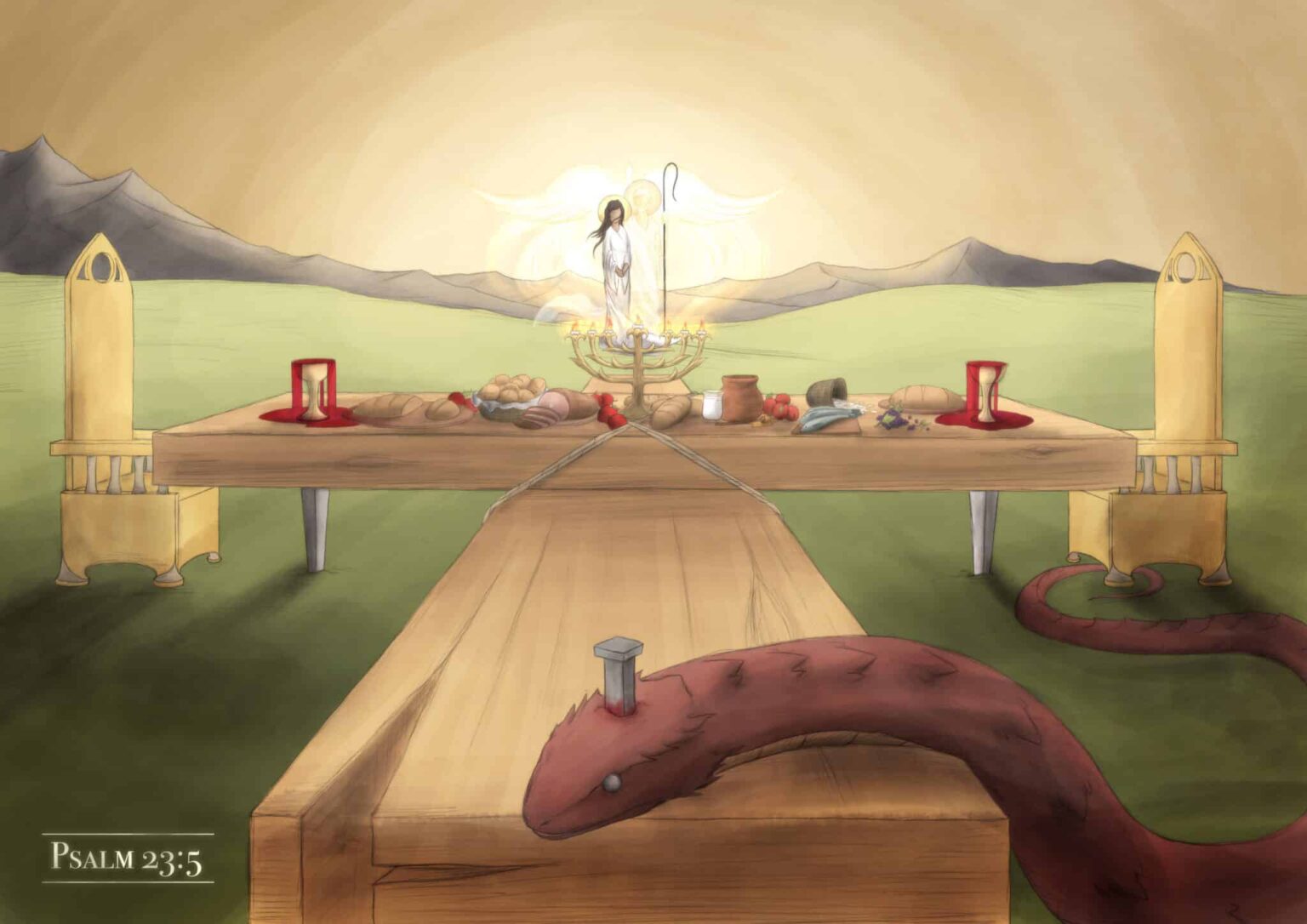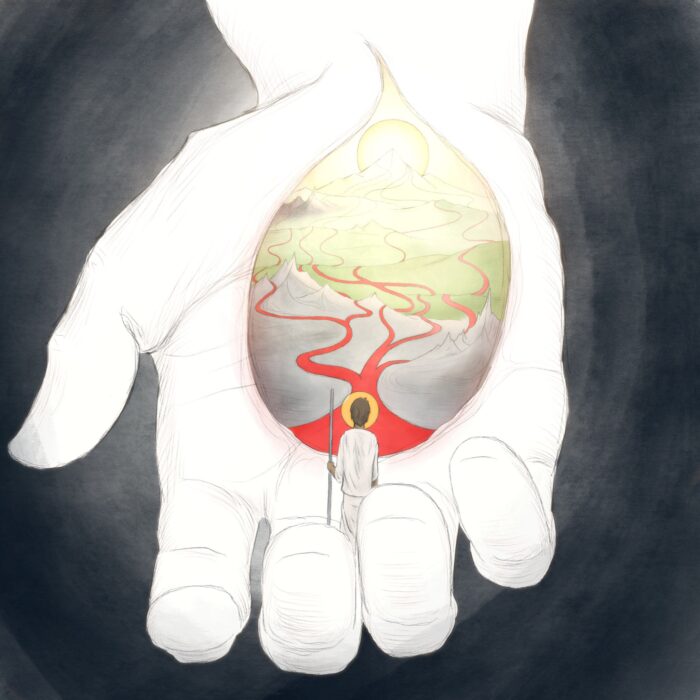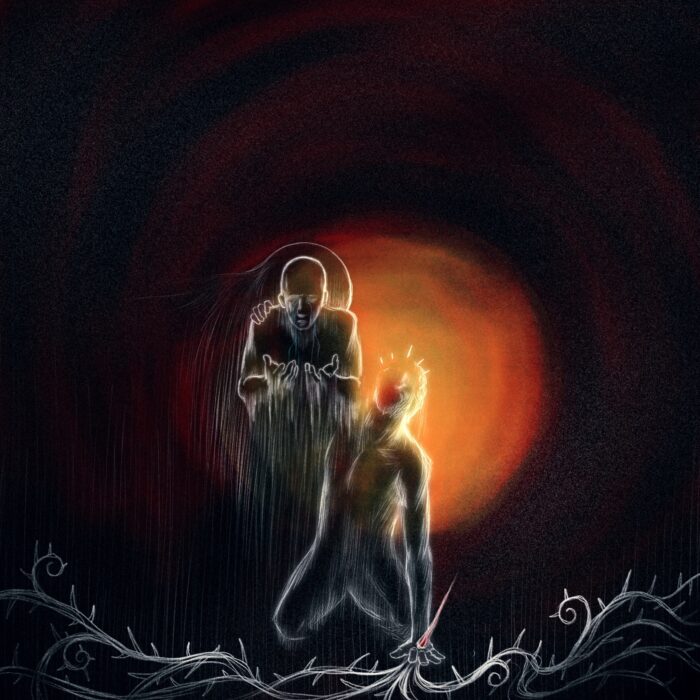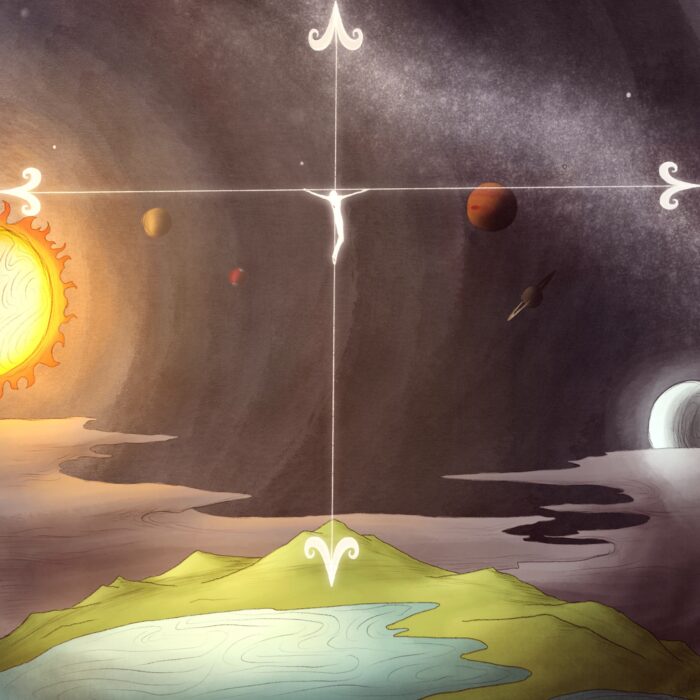You prepare a table before me
in the presence of my enemies;
you anoint my head with oil;
my cup overflows.
The Passage Explained
With verse 5, Psalm 23 seems to shift its central metaphor from that of shepherd and sheep to one that more prominently pictures YHWH as the master of a great house and the Psalmist as His guest. The imagery of a table prepared for the Psalmist in the presence of his enemies is rich with implications concerning the goodness of our God.
First, it bears witness to the abundant generosity of YHWH who feasts His people on good food. Though they are His possession (like sheep to a shepherd), He cares for them as precious children (since, as we know from the rest of scripture, they are that to Him as well). This point is made even more clear with the final two lines of the verse, “you anoint my head with oil; my cup overflows.” Both of these images point to the lavish, super-abundant generosity of YHWH’s heart toward His dependent people.
Second, this imagery highlights the sovereign authority of the Lord who is able to grant the Psalmist the relaxation, rest and peace that are typically associated with prepared meals, even though his enemies are present and opposed to his wellbeing. With abundant grace the Lord prepares a meal for His lamb-like people and with almighty power He enables them to enjoy it even in the presence of their enemies.
The Picture Explained
So for this image I wanted to highlight both of the theme of the Lord’s lavish generosity and His surpassing authority for the good of His people. However–as with the last two pictures in this series–I recognized that these words must be interpreted in light of the crucified and risen Christ who–by His death and resurrection–proves Himself to be the True Good Shepherd of whom David was ultimately singing (John 10:11). How does Christ “prepare a table” for His people? There are a number of answers that one could give: there is the wedding supper of the Lamb (Revelation 19:6-9), the food of God’s word (Matthew 4:4), or of joining in God’s work (John 4:34), and then–of course–there is the Lord’s Supper itself (Matthew 26:26-30, etc). However, as I thought about YHWH incarnate “preparing a table” for His people in lavish, overflowing generosity, I recalled two passages that I believe are connected. The first is Isaiah 25:6-9, and the second is John 6:52-57.
Isaiah 25:6-10 speaks of a day when “YHWH of hosts will make for all peoples a feast of rich food, a feast of well-aged wine, of rich food full of marrow, of aged wine well refined…” The text goes on to talk about YHWH “swallowing up” death forever and so being revealed to His people and conquering their enemies. John 6:52-57 picks up the theme of a feast prepared on Mt. Zion, but this time the flesh and blood of the crucified Lord is the metaphorical food and drink of God’s people. The imagery is startling, but the concept is solidly orthodox, namely that it is only by believing / receiving (here represented as feeding) on the crucified and risen Jesus as Lord and God that the people of God will truly live. He Himself, as He is revealed through Calvary’s climactic redeeming work, IS the feast–the feast which is eaten by faith and which gives eternal life–prepared for His people (For more on this imagery, see also Isaiah 55:1-3). It is on Mt. Zion, where the incarnate God gives Himself unto death in order to be the life-giving spiritual feast of His people, that the Lord swallows up death forever (Isaiah 25:7-8), shows Himself to be the long awaited Savior of His people (25:9), and tramples the enemies of His people into the earth (25:10).
With these things in mind, the “table prepared” for God’s people is the cross itself, and the feast to which they are invited is the spiritual food and drink of the slain and risen Christ received and believed as Lord, God, Savior, and Life. I depicted this by literally representing the table as the cross. The food on the table is various–not just bread–because my point is not that the Lord’s Supper (the sacrament of bread and wine) is the food, but that the slain and risen Jesus Himself is the food and that the eating is our belief (plus, I wanted to visually allude to the Isaiah 25 passage which refers to a variety of foods). There are two cups of wine as a way of highlighting the intimate fellowship into which the Lord calls His people (though He covenants with His global and trans-temporal people, Eph.5:25, He also loves and covenants with us as individuals, Gal.2:20). The cups also echo the wounds in Christ’s hands. The fact that they are literally overflowing is a reminder of the unrestrained generosity that YHWH displayed as He prepared this most extravagant of feasts for His Bride.
The seven-lamped menorah represents the Holy Spirit who is the Love through whom the Son offered Himself as a sacrifice to the Father (Hebrews 9:14) and through whom He is received as the spiritual feast of His people (John 7:37-39, John 16:14). The Spirit is the mediator of all the riches of Christ to us (John 16:14) and so I placed this lamp at the center of the table as a way of showing His indispensable role in our feasting by faith upon the Son. The seven fires of the menorah recede into the background and form a dove surrounding the woman and Christ. This not only represents the anointing that YHWH has placed on the head of the Church (2 Corinthians 1:21-22, 1 John 2:20,27), but also the role that the indwelling Spirit plays in the sovereign, saving and satisfying union of love between Christ and His Bride (John 14:15-17,23, Romans 8:9-11).
Lastly, note the serpent whose head is crushed by the nail that pierced Christ’s foot (Genesis 3:15). What greater enemy do the people of God have than Satan himself? And yet it was in the preparation of the Calvary’s table–in the giving of Himself for our lives–that God the Son trampled the ancient serpent into the dust. Because our Good Shepherd has laid down and taken up His life, we can feast on all the riches of who God is for us in Him even in the presence of our greatest enemy. Satan’s head is crushed, his fangs are shattered, and even if Sovereign Love grants him to take our fleeting lives, our eyes will open from death on the wedding supper of the Lamb and the devil will find that his dying malice has only served to deepen our joy in Christ.
Hallowed be the Name of God the Father, Son, and Spirit who gives Himself to prepare the table of eternal life before us in the presence of our greatest enemy. He anoints our redeemed heads with His Holy Spirit and overflows the cup of our salvation with ransoming rivers drawn from Immanuel’s veins.




